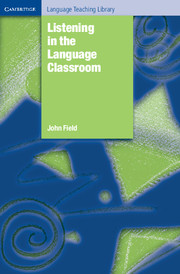Book contents
- Frontmatter
- Contents
- Dedication
- Acknowledgements
- Introduction
- Part I Background
- Part II Rethinking the comprehension approach
- Part III Process, not product
- Part IV A process view of listening
- 8 Input and context
- 9 Decoding and the inconsistent signal
- 10 Decoding: sounds, syllables and words
- 11 Using grammar and intonation
- 12 Amplifying what the speaker says
- 13 Handling information
- Part V The challenge of the real world
- Part VI Conclusion
- Appendices
- Glossary of listening-related terms
- References
- Index
- References
9 - Decoding and the inconsistent signal
Published online by Cambridge University Press: 01 October 2009
- Frontmatter
- Contents
- Dedication
- Acknowledgements
- Introduction
- Part I Background
- Part II Rethinking the comprehension approach
- Part III Process, not product
- Part IV A process view of listening
- 8 Input and context
- 9 Decoding and the inconsistent signal
- 10 Decoding: sounds, syllables and words
- 11 Using grammar and intonation
- 12 Amplifying what the speaker says
- 13 Handling information
- Part V The challenge of the real world
- Part VI Conclusion
- Appendices
- Glossary of listening-related terms
- References
- Index
- References
Summary
Vox nihil aliud quam ictus aer. (The voice is nothing but beaten air.)
Seneca (c. 4 BC – 65 CE), Roman philosopher and politicianThe last chapter suggested that decoding skills should play a larger part than at present in L2 listening programmes, and certainly a larger part than the comprehension approach normally provides for. Focusing on decoding skills rather than general comprehension is probably the most effective means of improving a novice listener's performance. This is not on the grounds that decoding is in some way ‘simpler’ than extracting information from a recording, but on the grounds that efficiency in the fundamental process of matching strings of phonemes to words and phrases allows the listener greater opportunity to focus on wider issues of meaning.
This chapter and the one that follows therefore take a close look at the way in which sounds reaching the listener's ear are turned into words. Here, we examine the raw material that the listener has to analyse and consider how informative it is. How consistent is the input received from a speaker and what difficulties do its inconsistencies present to the less experienced listener? Many of the characteristics to be discussed are common to all spoken production: for example, the tendency of the speaker to take short cuts between one sound and the next or the foregrounding of important words. But they are realised in different ways in different languages – thus posing challenges to the novice L2 listener.
Information
- Type
- Chapter
- Information
- Listening in the Language Classroom , pp. 140 - 162Publisher: Cambridge University PressPrint publication year: 2009
